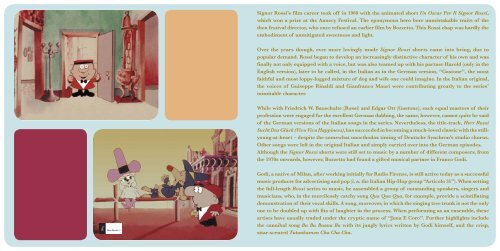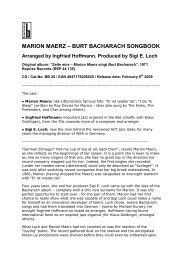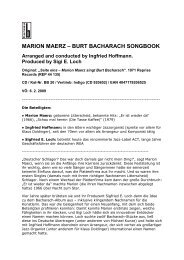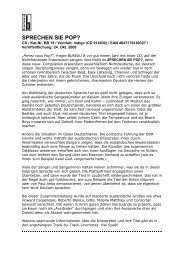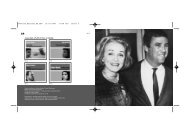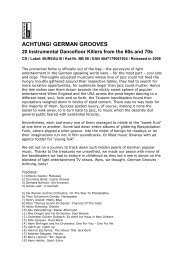Booklet - grosse freiheit
Booklet - grosse freiheit
Booklet - grosse freiheit
You also want an ePaper? Increase the reach of your titles
YUMPU automatically turns print PDFs into web optimized ePapers that Google loves.
Signor Rossi’s film career took off in 1960 with the animated short Un Oscar Per Il Signor Rossi,<br />
which won a prize at the Annecy Festival. The eponymous hero bore unmistakable traits of the<br />
then festival director, who once refused an earlier film by Bozzetto. This Rossi chap was hardly the<br />
embodiment of unmitigated sweetness and light.<br />
Over the years though, ever more lovingly made Signor Rossi shorts came into being, due to<br />
popular demand. Rossi began to develop an increasingly distinctive character of his own and was<br />
finally not only equipped with a voice, but was also teamed up with his partner Harold (only in the<br />
English version), later to be called, in the Italian as in the German version, “Gastone”, the most<br />
faithful and most loppy-lugged mixture of dog and wife one could imagine. In the Italian original,<br />
the voices of Guiseppe Rinaldi and Gianfranco Mauri were contributing greatly to the series’<br />
inimitable character.<br />
While with Friedrich W. Bauschulte (Rossi) and Edgar Ott (Gastone), each equal masters of their<br />
profession were engaged for the excellent German dubbing, the same, however, cannot quite be said<br />
of the German versions of the Italian songs in the series. Nevertheless, the title-track, Herr Rossi<br />
Sucht Das Glück (Viva Viva Happiness), has succeeded in becoming a much-loved classic with the stillyoung-at-heart<br />
– despite the somewhat unorthodox timing of Deutsche Synchron’s studio chorus.<br />
Other songs were left in the original Italian and simply carried over into the German episodes.<br />
Although the Signor Rossi shorts were still set to music by a number of different composers, from<br />
the 1970s onwards, however, Bozzetto had found a gifted musical partner in Franco Godi.<br />
Godi, a native of Milan, after working initially for Radio Firenze, is still active today as a successful<br />
music producer for advertising and pop (i. a. the Italian Hip-Hop group “Articolo 31”). When setting<br />
the full-length Rossi series to music, he assembled a group of outstanding speakers, singers and<br />
musicians, who, in the mercilessly catchy song Qua Qua Qua, for example, provide a scintillating<br />
demonstration of their vocal skills. A song, moreover, in which the singing tree trunk is not the only<br />
one to be doubled up with fits of laughter in the process. When performing as an ensemble, these<br />
artists have usually traded under the cryptic name of “Jona E Coro”. Further highlights include<br />
the cannibal song Bu Bu Buana Bu with its jungly lyrics written by Godi himself, and the crisp,<br />
sitar-scented Tutankamen Cha Cha Cha.


